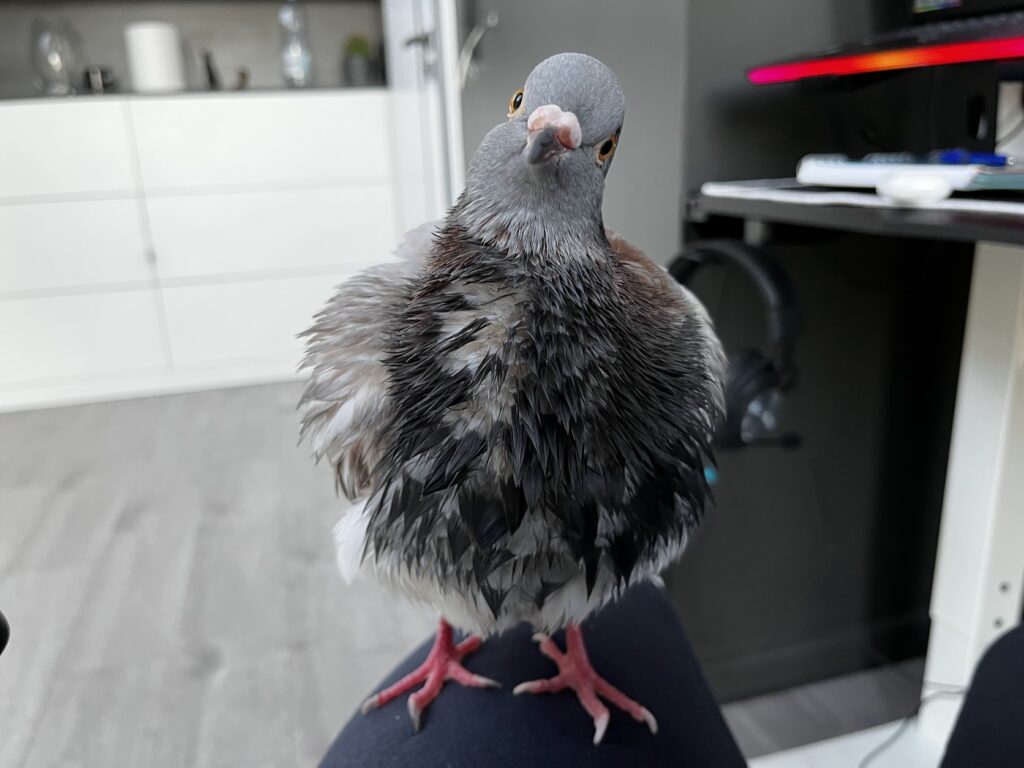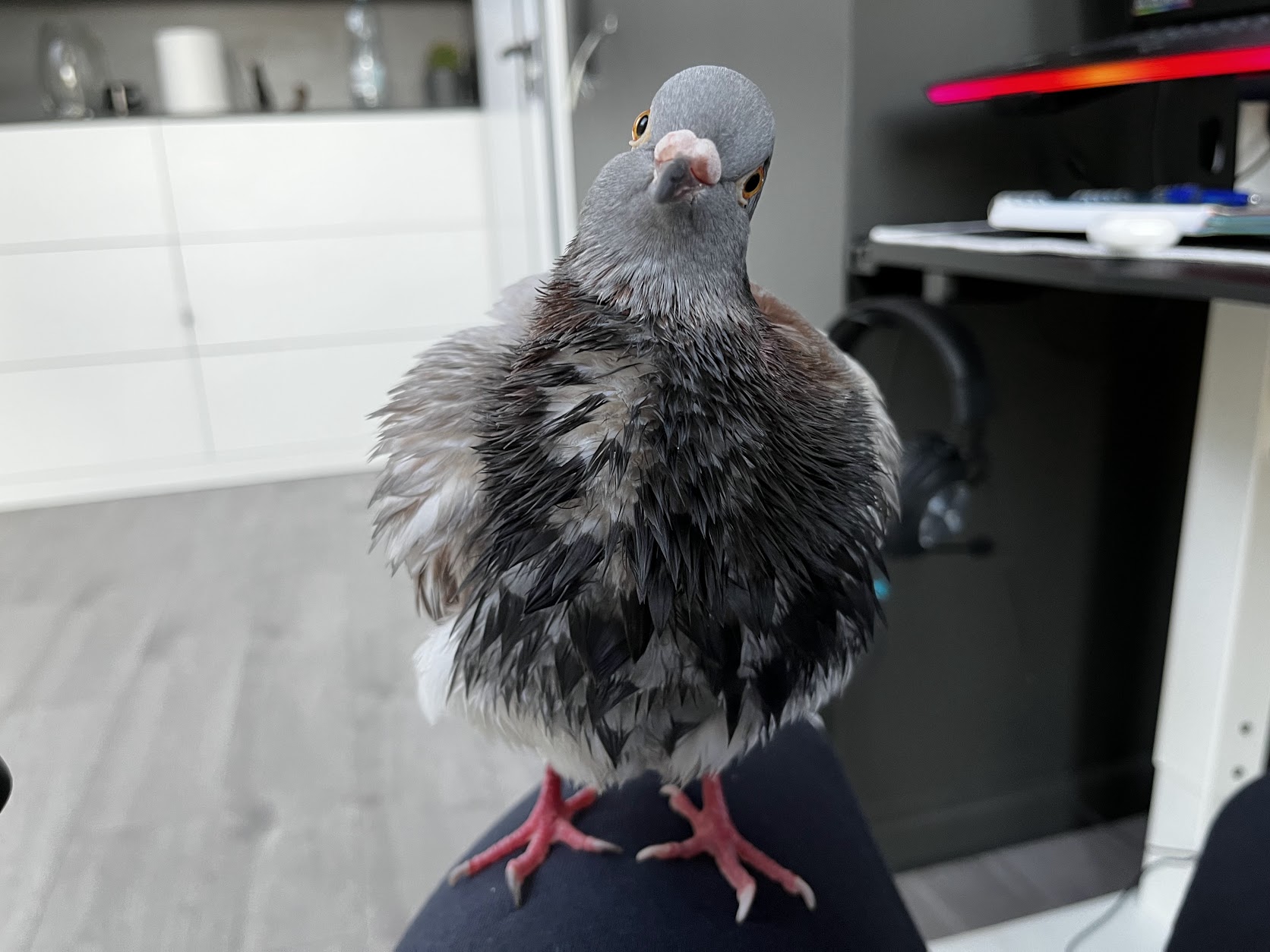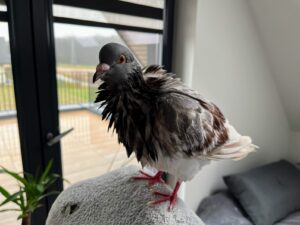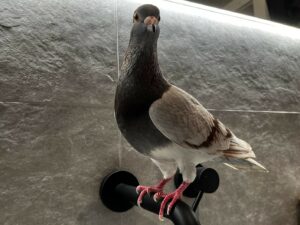Why do pigeons bob their head? Have you ever noticed that pigeons often bob their head up and down as they walk or forage for food? This interesting behavior is common among many birds, and it’s something that has long puzzled scientists and birdwatchers alike.
One of the things that always fascinates me about Gerard – my pigeon – and other pigeons is their tendency to bob their head. Have you ever noticed this behavior in pigeons before? If you have, you might be wondering why they do it.
In this article, I’ll explore some of the theories that have been proposed to explain why pigeons bob their heads, and we’ll take a closer look at the behavior of these fascinating birds.
JUMP TO:

Wondering why pigeons bob their heads? Background information first
Before we delve into the mysteries of head bobbing, it’s helpful to have some basic background information on pigeons.
- Pigeons are members of the bird family Columbidae, which includes over 300 species of birds found around the world.
- They are known for their unique anatomy, which includes a strong breast muscle used for flying, and a highly developed sense of direction that allows them to navigate over long distances.
- Pigeons are also highly social animals, and they are often found living in large groups or flocks.
- Pigeons are commonly found in urban areas, where they are attracted to the food and shelter provided by humans. In fact, the pigeon is often referred to as the “city bird,” as it has adapted well to living in close proximity to humans.
- Despite their reputation as pests, pigeons are actually quite intelligent and have a long history of being used for various purposes, such as carrying messages or racing.
Check these articles on pigeons too:
- Do Pigeons Explode When They Eat Rice?
- What To Do With Eggs My Pet Pigeon Layed
- Names For Pigeons (260+)
- Are Pigeons Good Pets?
- Why Do Pigeons Stand On One Leg?
Theories on why pigeons and other birds bob their heads
Now that we have some background information on pigeons, let’s explore some of the theories that have been proposed to explain their interesting head movements – head bobbing behavior.
Here are a few of the main ideas:
- Balance and coordination of their bodies: One theory is that pigeons bob their head to help maintain balance and coordinate their movements while pigeons walk or run. Pigeons have a unique anatomy that allows them to move quickly and efficiently, and head bobbing helps them to stay stable and on course while walking or running.
- Communication: Another theory is that pigeons use head bobbing as a form of nonverbal communication with other pigeons. For example, a pigeon might bob its head to signal dominance or submission to another pigeon. In my experience with Gerard, I have noticed that he will sometimes bob his head when he is interacting with other animals like my cats or my dog, so this theory definitely makes sense to me.
- Foraging: Finally, some experts believe that pigeons may bob their heads while foraging to help locate and identify food items. Pigeons are known to be skilled at finding food, and the head bobbing may help them to zero in on their next meal.
- Bird’s vision: One theory is that head bobbing helps birds to better process and interpret the visual information they are receiving (their visual surroundings). By moving their head up and down, birds may be able to scan their surroundings in a more systematic way, and this may help them to better identify potential threats or locate food sources. In addition, head bobbing may help birds to maintain their balance and coordinate their movements, which is especially important when they are in flight.
- Motion to control eye movements: The eyes of birds, like those of humans, are constantly moving in order to scan and interpret their surroundings. In birds, these eye movements are often coordinated with head movements, including nodding or bobbing. By moving their head and eyes in unison, birds may be able to better process and interpret visual information, as well as maintain their balance and coordination.
Additional factors behind head bobbing
There may be other factors at play when it comes to pigeon head bobbing as well. For example:
- Age: Some research has suggested that younger pigeons may be more likely to engage in head bobbing behavior than older pigeons.
- Health: Pigeons that are in poor health or experiencing stress may also exhibit more head bobbing behavior.
- Individual differences: Like humans, every pigeon is unique, and some may be more prone to head bobbing than others.
I love my pigeon’s head bob
I am endlessly fascinated by my pigeon Gerard and his habits, including the way he bobs his head up and down as he walks or forages for food. It’s a behavior that I’ve always found curious, and I’ve often wondered about the purpose behind this funny motion.
However, the true reason behind this behavior remains a mystery, and I find myself constantly watching Gerard and trying to understand more about his unique habits, body movements, motion, and behaviors.
Regardless of the reason behind it, I find his head bobbing to be one of the many charming and endearing qualities of my beloved pigeon.




